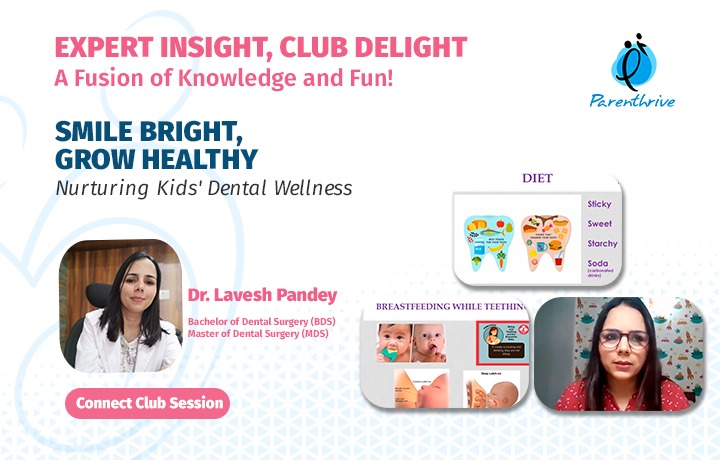
Parenthrive held a session on the importance of nurturing dental health from a young age in children on the 21st of June from 8 p.m. onwards via Zoom. The session was conducted by Dr. Lavesh Pandey (BDS, MDS) The session was attended by many interested parties and members alike!
The discussion started as follows, this article contains the main takeaways from the session.
Ensuring good dental health from an early age is essential for a child’s overall well-being. Here’s a detailed guide on nurturing dental wellness in young children:
The Importance of Dental Health
Dental health directly affects a child’s overall health, including physical development, general body health, and psychological well-being. Healthy dental practices need to be established early, and parents must model good oral hygiene habits.
- Physical Development: Good dental health aids in eating, speaking, and breathing properly. Dental issues can hinder these basic functions, impacting a child's growth and development.
- General Health: Oral infections can spread to vital organs like the heart and brain via the bloodstream. For example, untreated cavities can lead to serious infections that compromise overall health. Infected milk teeth can negatively impact the development of permanent teeth, leading to more complex dental issues in the future.
- Psychological Impact: Dental issues such as crooked or decayed teeth can lead to bullying and social anxiety, affecting a child's confidence and academic performance. Ensuring healthy teeth can help a child feel more comfortable in social situations and improve their self-esteem.
Age-Specific Dental Care
Newborn to 2 Years
- Gum and Tongue Care: Clean gums and tongue with a soft cloth after feedings to remove milk residue and bacteria. This establishes a foundation for good oral hygiene even before teeth emerge.
- Teething: Use gum massages, frozen washcloths, cold raw veggies, and teethers to soothe discomfort. Avoid teething necklaces and liquid-filled teethers; use solid rubber-based, FDA-approved, BPA-free options.
- Breastfeeding: Continue breastfeeding but be mindful of oral hygiene. Clean the baby's mouth after feedings to prevent milk from pooling around emerging teeth.
- Avoid Myths: Do not give honey to infants under one year of age due to the risk of botulism. Avoid numbing gels containing benzocaine as they can cause harmful side effects.
2 to 6 Years
- Oral Care: Use a wet washcloth for the first few teeth, then transition to a finger brush as more teeth appear. This helps remove plaque and bacteria, preventing cavities.
- Brushing: Use fluoride toothpaste designed for children. Supervise brushing to ensure proper technique, teaching children to brush for at least two minutes and cover all tooth surfaces.
- Diet: Limit sugary, sticky, and starchy foods, as well as carbonated drinks, to prevent cavities. Encourage healthy snacks like fruits, vegetables, and cheese, which are better for teeth.
6 to 12 Years
- Permanent Teeth: As permanent teeth erupt, continue with regular dental check-ups twice a year to detect early cavities, jaw size issues, and oral habits that might require intervention. Early detection can prevent more serious dental problems.
- Brushing: Children should use fluoride toothpaste. Transition to adult toothpaste around age 12, ensuring continued protection against cavities and gum disease.
Common Dental Issues and Solutions
Cavities and Tooth Decay
- Causes: High sugar intake, poor oral hygiene, and frequent snacking can lead to cavities.
- Prevention: Regular brushing with fluoride toothpaste, a healthy diet, and regular dental visits can prevent cavities. Sealants can also be applied to protect against decay.
- Treatment: Cavities may require fillings or crowns. Early detection and treatment can prevent more extensive dental work.
Gum Disease
- Signs: Red, swollen, or bleeding gums can indicate early stages of gum disease (gingivitis). If left untreated, it can progress to periodontitis, a more severe form of gum disease.
- Prevention and Treatment: Maintain good oral hygiene by brushing and flossing regularly. Professional cleanings and check-ups can help detect and treat gum disease early.
Tooth Misalignment
- Detection: Regular dental visits help detect alignment issues early, allowing for timely intervention.
- Treatment: Orthodontic treatments such as braces can correct misaligned teeth, improving function and appearance. Early intervention can reduce the duration and complexity of treatment.
Teeth Grinding and Traumatic Injuries
- Teeth Grinding: Common in children, especially during sleep. It can cause wear on teeth and jaw pain. Monitoring and consulting with a dentist can help manage this condition.
- Injuries: Traumatic injuries to front teeth are common in children due to falls and sports. Prompt dental care can prevent long-term issues and preserve dental health.
Tips for Parents
- Model Good Behavior: Demonstrate proper brushing and flossing techniques. Children are more likely to follow good habits if they see their parents practicing them.
- Make Brushing Fun: Use songs, games, or a reward system to make brushing enjoyable. This can encourage children to stick to a regular oral hygiene routine.
- Educate About Sugar: Teach children the impact of sugary foods on their teeth. Explain how sugar leads to cavities and the importance of choosing healthy snacks.
- Monitor Brushing: Supervise brushing until they can brush effectively on their own, typically around age seven or eight. Ensure they are brushing for the recommended two minutes twice a day.
By following these comprehensive guidelines,Dr. Lavesh instructed on how parents can help their children develop healthy dental habits that will benefit them throughout their lives. Regular dental care, proper hygiene practices, and a healthy diet are key to maintaining good oral health and overall well-being.






